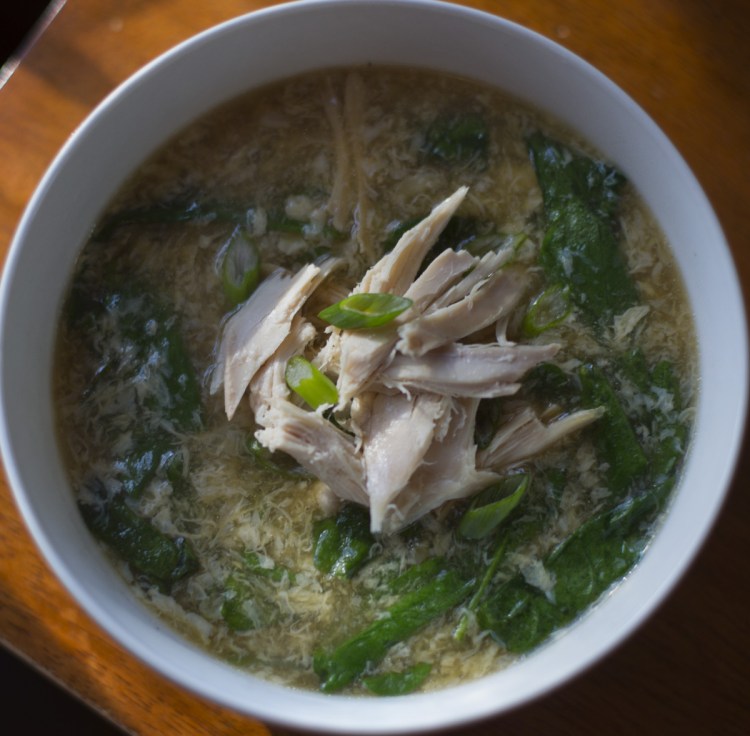One of my strategies for putting the decadence of the holidays (and the corresponding weight gain) behind me is to have soup for at least one meal a day. Good soups start with good stock. The best stocks come from old ladies. I’m talking about stewing hens.
A stewing hen is a retired egg layer. If you partake in the local egg supply, using stewing hens in your cooking honors the life cycle of local farms. Local eggs are so lovely because the chickens who produce them spend most of their days eating grass and bugs. But after a couple of years even in the happiest of living conditions, an aging hen isn’t able to lay as many eggs. To keep up with the demand for eggs and make space for new, more productive layers, farms cull these older hens. Butchering and selling these hens provides a revenue source for farms, while eaters get high-quality pastured meat and the raw material to make great stock.
Most chickens raised as roasting birds are butchered at about 12 weeks of age. They’ve not had a chance to work their muscles for long, and so, the meat is very tender. Conversely, the meat from stewing hens is quite lean and contains a lot of connective tissue, which must be broken down through low, slow cooking.
There isn’t a specific season during which local farmers sell stewing hens, said Jake Galle, who raises certified organic eggs and poultry (as well as grass-fed beef, lamb and goat) on Apple Creek Farm in Bowdoinham. So to find one, you’ve got to ask the farmer from whom you buy your eggs.
Galle bought new laying hens last spring, which led to him culling his flock of non-productive hens. He still has plenty of frozen three-pound stewing hens available for $10 each.
Other local farms that advertise on their websites that they have stewing hens include Misty Brook Farm in Albion and Willow Pond Farm in Sabattus. But it’s worth asking any local egg supplier if they also sell stewing hens. It is more likely that farmers who sell other meats alongside their eggs – and therefore have an established relationship with a local processor – will have stewing hens available. For example, Maine-ly Poultry doesn’t bring such hens to the Brunswick Winter Farmer Market at Fort Andross in Brunswick, where I shop, as a matter of course, but you can call the farm and order a few to be brought to the market as a special order.
I like to buy two at a time. I remove the legs and thighs and save them to be braised according to Julia Child’s Coq au Vin recipe. I throw the remainder of the birds into a pot with standard chicken stock ingredients (onion, shallot and carrot peels, celery ends and fennel stalks, parsley and thyme stems, black peppercorns, a couple of bay leaves and lots of cold water) and slowly simmer them for 6 to 8 hours until the broth is well-flavored and the breast meat falls off the bone. I strain the stock and pick the meat from the bones for use in future soups, chicken salads and enchiladas. One of these hens will yield about 6 ounces of cooked breast meat. I then skim (and save for future sautéing and baking adventures) the yellow solidified fat from the cooled stock before freezing the latter in ice cube trays, 1-cup, 2-cup and quart-sized reusable containers.
When I’m done with this process, I’m pretty sure I’ve duly honored the lives of these particular old ladies.
Christine Burns Rudalevige is a food writer, recipe developer and tester and cooking teacher in Brunswick, and the author of “Green Plate Special,” a cookbook from Islandport based on these columns. She can be contacted at:
cburns1227@gmail.com
Copy the Story LinkSend questions/comments to the editors.



Success. Please wait for the page to reload. If the page does not reload within 5 seconds, please refresh the page.
Enter your email and password to access comments.
Hi, to comment on stories you must . This profile is in addition to your subscription and website login.
Already have a commenting profile? .
Invalid username/password.
Please check your email to confirm and complete your registration.
Only subscribers are eligible to post comments. Please subscribe or login first for digital access. Here’s why.
Use the form below to reset your password. When you've submitted your account email, we will send an email with a reset code.